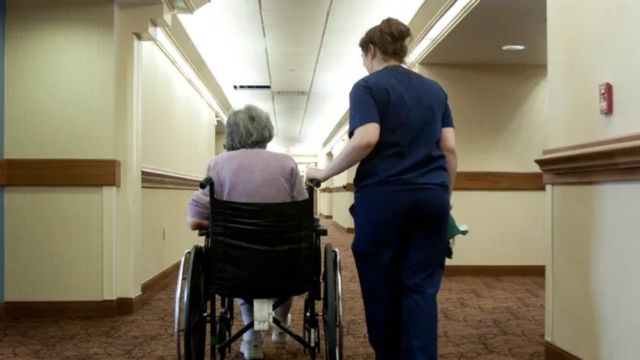
Some organizations are calling for tougher regulations to increase staffing numbers at nursing homes as regulators witness deteriorating care and conditions in these facilities. However, business associations and leading lawyers in over a dozen states, including Virginia, opposed a federal mandate that would have mandated precisely that.
After her father passed away in a nursing facility in Henrico, Tracey Pompey founded the advocacy group Justice and Change for Victims of Nursing Facilities, and she has been advocating for more stringent regulation of the sector for years.
Pompey stated, “There needs to be strict enforcement in these nursing facilities. There’s no accountability.”
at addition to having a terrible experience at a nursing home that affected her family, she worked as a nursing assistant for thirty years.
Having to care for individuals with little assistance and resources was one of the lessons learned during that period, she said.
Pompey stated, “Because the facility would keep you short staffed, I’ve taken care of 15 to 20 patients before.”
In order to address staffing concerns, the Centers for Medicare and Medicaid Services created a rule last year during the Biden administration.
Nursing homes, according to the former president, would “chronically under-staff” their facilities, resulting in “poor, substandard care that endangers residents” and potentially causing avoidable injuries like bedsores and falls.
“This is a very hands-on profession. Residents need help bathing, dressing, eating, transferring, all kinds of things, and you need people there to do that,” Toby Edelman, a senior policy attorney with the non-profit Center for Medicare Advocacy stated.
Edelman welcomed the ultimate proposal, but expressed her wish that CMS had created a stronger staffing mandate.
According to CMS’ rule, institutions must provide a total of 3.48 hours of nursing care per resident each day, with a registered nurse and nurse aide providing a specific breakdown of the amount of time.
Additionally, facilities have to have a registered nurse on staff seven days a week.
“Residents can get sick in the middle of the night. They’re not just going to get sick during normal business hours, so the importance of having registered nurses who are able to do assessments and figure out what is going on with residents is very important,” Edelman stated.

The CMS stated that the action “affirmed its commitment to hold nursing homes accountable for providing safe and high-quality care for the nearly 1.2 million residents living in Medicare- and Medicaid-certified long-term care facilities.”
New Kansas Bill Could Make Move Over Law Apply to Disabled and Stopped Cars
A federal survey conducted in 2024 found that the national average number of hours of care per resident per day was 3.78, which was higher than the suggested minimal standard of 3.48.
According to the report, for-profit facilities were most likely to fail to meet the requirements. Edelman stated that low-rated nursing homes that CMS has identified as understaffed and having poor inspection performance would be most affected by the regulation.
CMS said it would allow facilities to start implementing the changes in phases over a number of years and for certain institutions to be excluded from the regulation depending on workforce conditions and geographic location.
However, there has been a lot of opposition to the ruling.
$1.5 Million Settlement Reached in SouthEast Bank’s Student Loan Discrimination Case
Along with other Republican attorneys general nationwide, Virginia’s attorney general Jason Miyares has joined a lawsuit to block the CMS rule’s implementation.
“Another example of Washington bureaucrats imposing sweeping mandates without considering the devastating impact on our communities,” Mirayes said of the proposal.
According to him, it would cost states hundreds of thousands of dollars, drive out already financially troubled nursing homes, and leave residents and families with less options when it comes to nursing home care.
The Virginia Healthcare Association (VHCA), an industry association that advocates for nursing homes throughout the state, said CMS took “an illogical approach to solving the nursing crisis by requiring specific, mandated nursing levels while nursing homes are still grappling with a historic labor crisis and there’s a growing caregiver shortage.”
When VHCA polled its members in late 2024, 165 assisted living and nursing homes responded, and the vast majority of them mentioned a shortage of nursing staff.
In addition to staffing constraints, the majority of institutions reported a waiting for new admissions and a lack of applications from eligible applicants.



